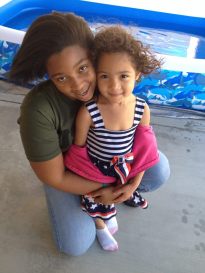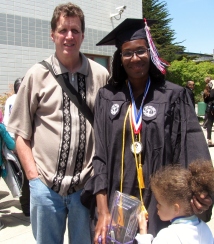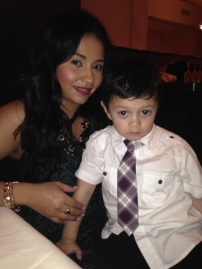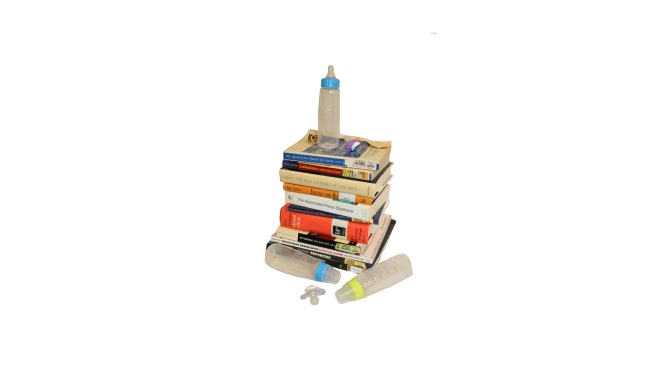Elizabeth Silva
Staff Writer
Whereas most college students’ schedules include classes, studying, going out with friends, and perhaps a job or an internship, some college students’ schedules also include taking care of and raising a child. While students with children are only a small percentage of students at USF, approximately 25% of college students in the United States have dependent children, according to an Institute for Women’s Policy Research study.
The changing demographic of college students has impacted the number of students in college with children. According to U.S. Education Department data, about 40% of college students are older than 25 years and nearly 20% work full-time.
College parents have a unique set of challenges, which include finding a balance between school, work, family, and household and personal responsibilities. The challenges can be stressful at times, but some colleges have programs to help college students transition from students to parents and vice versa.
Yuki Williams, who attended her freshman year at USF last year, has a four-year-old daughter, Destinee, back home in Las Vegas. This year she is attending University of Nevada, Las Vegas and is back home with her daughter and is balancing school, work, and raising her daughter.

“Being away from Destinee definitely was a huge part of me moving back. I missed her so much and saying goodbye or see you later after every visit just kept getting harder and harder to do,” said Williams. “I also missed my family though. I mean, I had never been so far away from everyone before for longer than a few days.”
Williams said that the USF community reacted really well when she told them about Destinee. Everyone that she told was accepting and ended up falling in love with Destinee.
While Williams did not really need any assistance because her daughter was not in the City, she did not hesitate to state that if she had actually needed help she was sure that USF would have found a way to help.
Even professors were understanding when Williams would explain to them that she was taking an extra day of vacation before or after a break to spend more time with her daughter who was in Las Vegas.
“Going to school without her near me was challenging at times. Studying was difficult because I was so used to her being around me that I had to adjust and study while being on Skype with her,” said Williams.
Some people may have judged Williams for choosing to go to a school hundreds of miles away from her daughter.
“Most people didn’t understand it, but those people were people who had no worries besides simply school. It’s hard for anyone that doesn’t have a child or a child [at a] young [age] to understand why that little time away was good for me,” said Williams. “It gave me a chance to really figure myself out as a person and not just a mom. I love my daughter, but I need[ed] to grow a little.”
Across the nation there are daycare centers, scholarships and financial aid for parents in college, online education for college parents, and student organizations that help college students balance parenting with school.
There are over 1,200 schools that offer on-campus day care centers and child care programs, including San Francisco State University (SFSU), Santa Clara University, University of California—San Francisco, University of California—Berkeley, and Stanford University according to Campus Explorer’s website.
While USF does not offer on-campus day care centers for its students, it offers other programs and support for students who have children or are going to have a child.
According to USF’s Health Promotion Service’s website, students are “encouraged to continue [their] education at the University of San Francisco if [they] desire and are physically able to. The University community will support [their] academic and personal growth and accommodate [their] needs regarding course work and housing. [They] will also have the option to take a leave of absence up to one year and come back and resume [their] studies.”
Other resources on campus include: Health Promotion Services, University Ministry, Dean of Students Office, Counseling and Psychological Services, Residence Life, Student Disability Services (SDS), and One Stop, which assists with financial aid package adjustments.
SDS helps about seven percent of the student body and about one percent of that seven percent is pregnant students.
“We provide reasonable access to all aspects of student life and educational support and services to all students,” said Corey Barber, SDS office coordinator. “Pregnancy can be a temporary disability and how disabling their pregnancy may or may not be could cause us to help arrange with missing class as long as it doesn’t interfere with school work or missing a test.”
Students will need documentation from a doctor stating that the person is pregnant and needs help in order for SDS to offer assistance.

Tina Rhodes, a senior at USF who is taking this semester off, has a seventeen-year-old daughter, Catrice, and a five-year-old daughter, Stephanie. Part of the reason that Rhodes is taking the semester off is because she felt that USF was not very accommodating to students with parents.
Rhodes previously attended City College of San Francisco (CCSF) and she mentioned that the school had daycare on site.
“I didn’t feel like there was a family vibe on campus [at USF],” said Rhodes.
She acknowledged that the lack of family vibe could be partially due to the demographic of students, especially at CCSF where classes could be made up of people who are returning school at a more mature age.
“I think that the professors [at CCSF] are definitely more understanding. You have a lot more blue collar professors that I noticed are more…empathetic to an older student coming in with a family,” said Rhodes.
While Rhodes does not believe in special treatment or attention because of her child, she found that she did not feel comfortable sharing about her family and children with other USF students.
“I felt some—not shame—but just embarrassment. I just felt that when I did tell some of the younger students or when it came up as I was talking to them…then there was the ‘Oh, how old are you anyway?’” said Rhodes. “I found myself staying quiet after a while and I realized that kids are going to react because they’re kids themselves and they’re nowhere near thinking about [having kids].”
Rhodes plans to attend USF in the spring, but will be applying for SFSU for fall 2015.

Karen Yepez, a recent SFSU graduate, had her son, Jayden Aviles, when she was 21 years old. Her son is now 3-and-a-half.
It was a hard and stressful time for her as she had to balance working full-time, going to school full-time, and taking care of a baby. She would wake up at 6 a.m. and be at work at 7 a.m. and work until 3 p.m. Then after work, she would go to home and see Jayden for 30 minutes before going to class from 4 p.m. to 10 p.m. After class, she would get home around 11p.m. and then do homework until 2 a.m. and then go to sleep. Then, the next day, it would start up again. This was her schedule from January 2010 to May 2014.
“Having a baby is hard, but it’s not the end of the world. Your dreams should not end there. It should only encourage you to strive more and want it more,” said Yepez. “It definitely makes things harder, especially if you don’t have a support system that’s going to help you with the baby.”
Yepez had the support her family and her boyfriend throughout the pregnancy.
Yepez advises student in her position to not give up. “Don’t ever let a baby be an excuse as to why you dropped out of school, why you felt that you didn’t deserve any better. Sure the road may be a little longer and harder for you now, but…if a baby’s meant to be in your life, it’s going to be in your life,” said Yepez.

